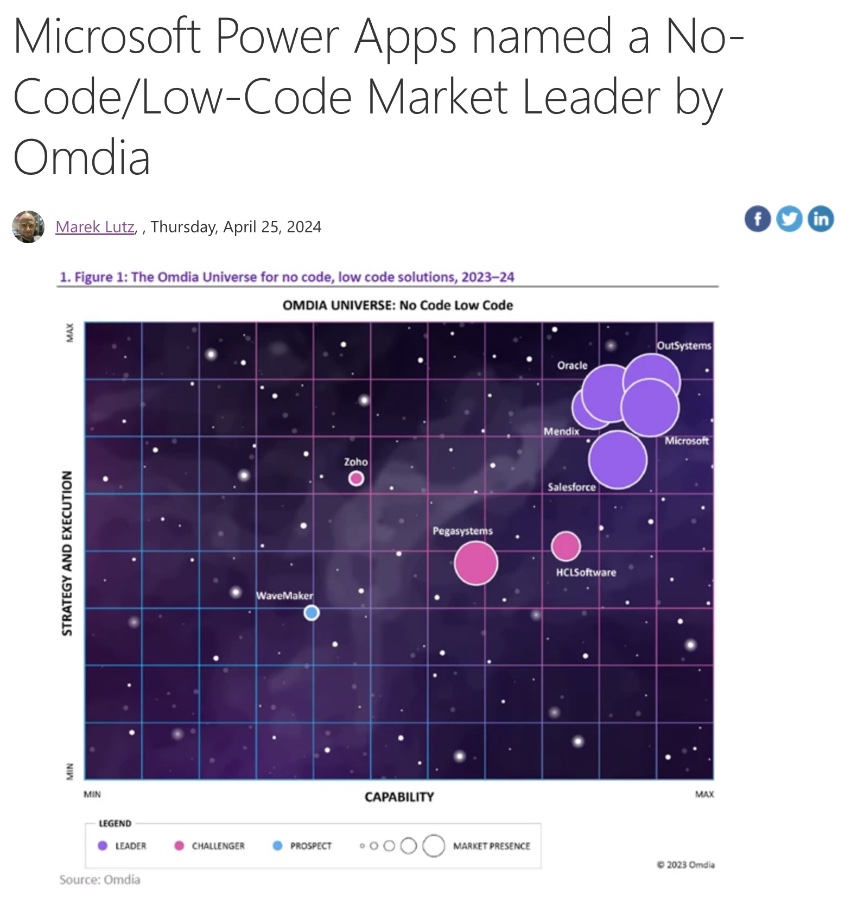
Omdia Ranks Microsoft Power Apps Top No-Code/Low-Code Leader
Microsoft Power Apps Leads in No-Code/Low-Code Market, Omdia 2023-2024 Report Reveals
Key insights

- Microsoft has been recognized as a Leader in the Omdia Universe: No-Code, Low-Code Solutions 2023-2024, thanks to Power Apps' technological capabilities, market reach, and momentum.
- Integration with AI and a strategic partnership with OpenAI enhances Power Apps, significantly accelerating developer productivity through the use of generative AI across the Microsoft Power Platform.
- Power Apps serves both citizen and professional developers, offering a comprehensive range of features to enable rapid application development without deep coding knowledge.
- The platform supports extensive integration with Microsoft Azure services, thereby boosting productivity and scalability for developers by utilizing Azure functions, APIs, and services within their solutions.
- Power Apps promotes collaboration within organizations by empowering citizen developers to build custom applications, thereby tapping into a wealth of creativity and ensuring effective governance and control across the board.
Exploring the Impact of Power Apps in the No-Code/Low-Code Arena
Microsoft Power Apps is making significant waves in the development industry by positioning itself as a leading tool in the no-code/low-code (NCLC) arena. Recognized by Omdia for its cutting-edge technological capabilities, market presence, and forward momentum, Power Apps is proving to be a game-changer. Driving this success is its ability to empower both novice makers and experienced developers to create robust applications with ease. The platform's deep integration with AI, particularly through its collaboration with OpenAI, has transformed productivity by enabling the use of generative AI in app creation. This brings a new level of efficiency and innovation to app development processes.
Furthermore, Power Apps' broad appeal is also seen in its versatile feature set that supports a wide range of development tasks without requiring extensive coding knowledge. This democratization of development extends the ability to create and innovate to a broader audience, fostering a collaborative environment within organizations. By coupling with Microsoft Azure services, developers have at their fingertips a powerful suite of tools to enhance their applications further. Additionally, the platform’s focus on governance and control ensures that solutions can scale effectively while maintaining compliance and security standards. Power Apps is not just simplifying application development; it's reshaping how businesses think about and engage with software solutions.
Read the full article Microsoft Power Apps named a No-Code/Low-Code Market Leader by Omdia

People also ask
Is Microsoft Power Apps low-code or no-code?
What are Azure Power Apps?
Azure Power Apps is renowned for its low-code development framework that significantly simplifies the process of creating applications for varied devices. It integrates flawlessly with Azure services, offering a sophisticated extensibility framework that caters to the needs of professional developers.Can you use Microsoft Power Apps for free?
Microsoft Power Apps offers two complimentary plans tailored for distinct objectives: the Power Apps Plan Trial and the Power Apps Developer Plan. The Power Apps Plan Trial, available for a 30-day period, is ideal for those looking to test Power Apps applications in a production environment. Post-trial, options to purchase a plan are available.Is Power automate a low-code platform?
Power Automate exemplifies the essence of low-code platforms by making workflow development accessible to a broader audience, regardless of their coding expertise. This democratization of technology empowers individuals to enhance their productivity with minimal programming requirements.
Keywords
Microsoft Power Apps, No-Code/Low-Code Market Leader, Omdia, Business Application Platform, Rapid Application Development, Citizen Developers, Enterprise Mobility, Digital Transformation